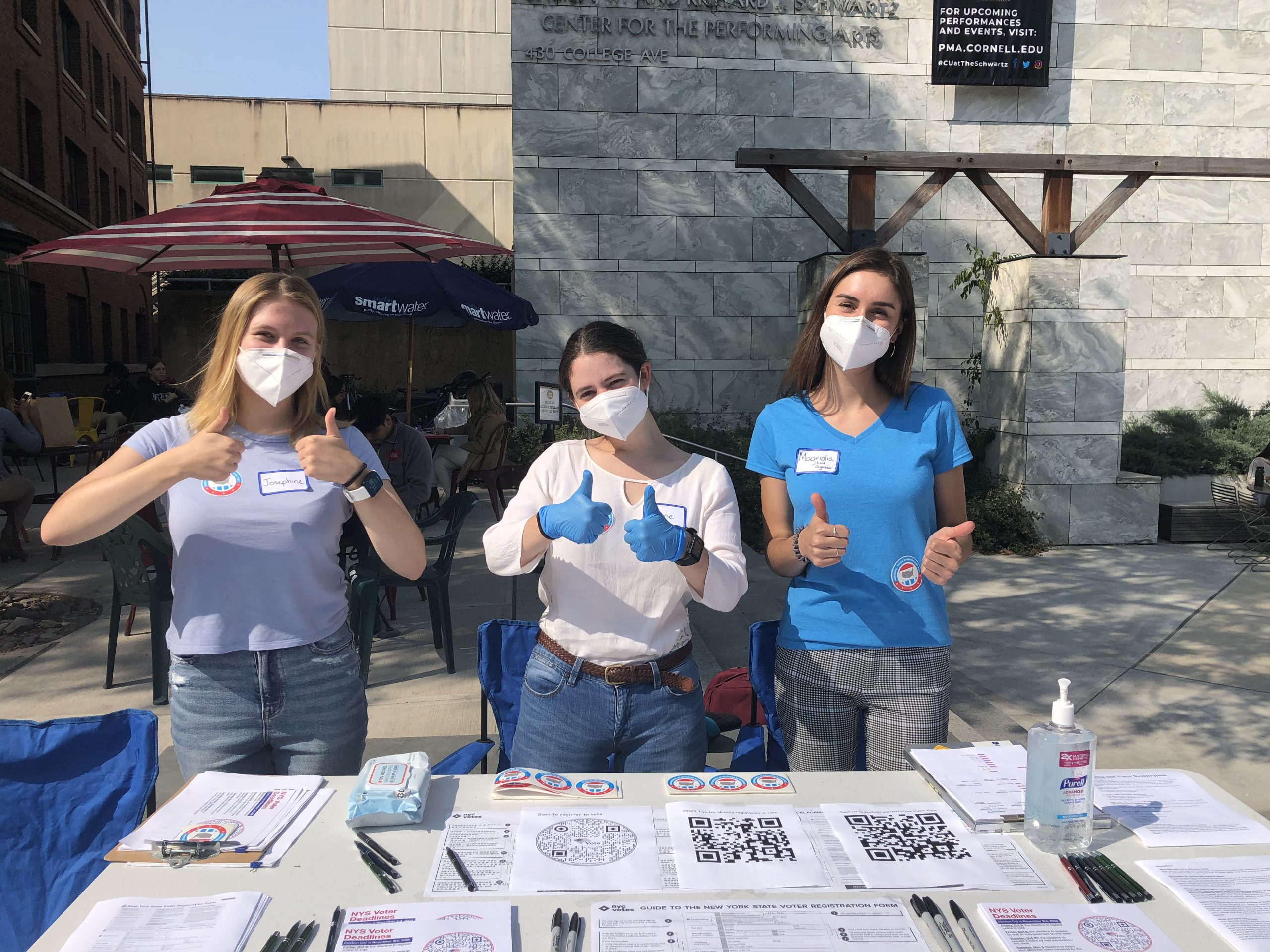While Cornell students bustle across a collegetown street under a high, equinoctial sun, three IHS students manage a table stocked with flyers, stickers, and pens, all emblazoned with one word: vote. This is a voter registration event, organized by senior class president candidate Magnolia Mead. She stands at the head of the table behind a large hand sanitizer dispenser and a list of registration deadlines. Next to her, Jane Putnam ‘21 and Josephine Goodreau ‘23 (they were later relieved by Ruby Wilson ‘21, Maya Blanchard ‘21, Saba Weatherspoon ‘21, Louisa Miller-Out ‘22, and Laura Mead ‘24) manage clipboards with gloves and direct passersby to QR codes they can scan with their phones that tell people if they’re registered to vote not. Ironically, not a single one of the students working the table will be able to cast a ballot on November 3, but this is part of the reason they have all showed up to run the table, even though they’ll have to make up an entire day of school.
Organizing drives like this is one way students feel they can influence the outcome of an election that will affect them tremendously. Mead says, “I was frustrated that young people couldn’t vote and I didn’t want to just sit by and let our future be decided by people who don’t really represent us. This was a way that I could make a difference.” Although the drive is strictly non-partisan, calls to vote are almost always raised by Biden supporters who want increased voter turnout to ensure a win for the democratic candidate over Trump. Putnam and Goodreau echo Mead’s statement, saying that they wanted to take an active role in the upcoming election. Even through their masks, it’s clear their passion is genuine. They are certainly active from their table, reaching out to students as they walk by, passing out stickers, and calling through the roar of trucks and the constant drone of collegetown traffic.
By noon, the group has gotten around a dozen students to register, a number that Mead is glad to reach early on in their day. “A huge percentage of student voters don’t vote,” she adds and she’s right, though, thanks to efforts like hers, and an increasingly divisive political climate, that is changing. According to a national study conducted by the Institute of Democracy and Higher Education at Tufts University, from 2016 to 2018, voter turnout among college students soared from 14 to 40 percent, and, by helping register voters before New York State’s registration deadline of Friday, October 9, Mead hopes to ensure that number will continue to climb this November.
What has spurred this political involvement and engagement with democracy from citizens who can’t even participate in it? Well, first off, students feel their futures are in jeopardy. They feel that crucial issues swing in the balance of this election: climate change, gun policy, racial justice, and LGBTQ+ rights, being just a few examples. Raia Gutman ‘22 explains students’ high level of involvement in politics by a newfound news literacy. She says that in past years, students “have realized issues affect them too.” She cites the 2018 Stoneman Douglas school shooting, and the murderers of George Floyd and Breonna Taylor as inciting students to get involved by signing petitions, attending protests, and sharing information on social media. She says, “It is a reality of the 21st century that so many teenagers are politically active—with so many oppressive forces, opposing perspectives, and messages of equality and justice, it is no wonder that we notice unfairness in our world.”
Gutman doesn’t think this unfairness can be completely solved through voting however. Despite believing that encouraging young people to vote helps them to “know which candidates push which issues and how to vote in the changes they want to be made,” Gutman worries, that this push for electoralism, especially across social media, neglects “the issues facing their communities for a broader awareness of the country and even the world,” and that support of wider issues “often become trends that do little to help people who, for instance, are targeted by police violence here in Ithaca or have lost resources due to the climate crisis.”
She, like many students, feels working in the local community can have a much more immediate and tangible impact. Gutman says, “Being active in one’s community is wholly beneficial; it acquaints a privileged person with their privilege and an underprivileged person with their support networks and the resources available to them.” She urges her peers that, “Once you’re registered to vote, check when the next Black Lives Matter protest is, and show up to hear members of your community discussing the issues that concern them.” She also mentions the food-sharing cabinets established by Mutual Aid Tompkins the locations of which have been shared across instagram stories, commenting that, “Seeing their peers post about this can lead a student who needs food and a student who has food to contribute to a clear step they can take to meet the needs of themselves and others in their community.”
In the end, most students are on the same page: political involvement is necessary. Whether they think that involvement should look like handing out stickers and registering college students to vote, working at the polls, or protesting and sharing food, depends on the person. Either way, students are caring about the future of this country, perhaps more than they ever have before.

